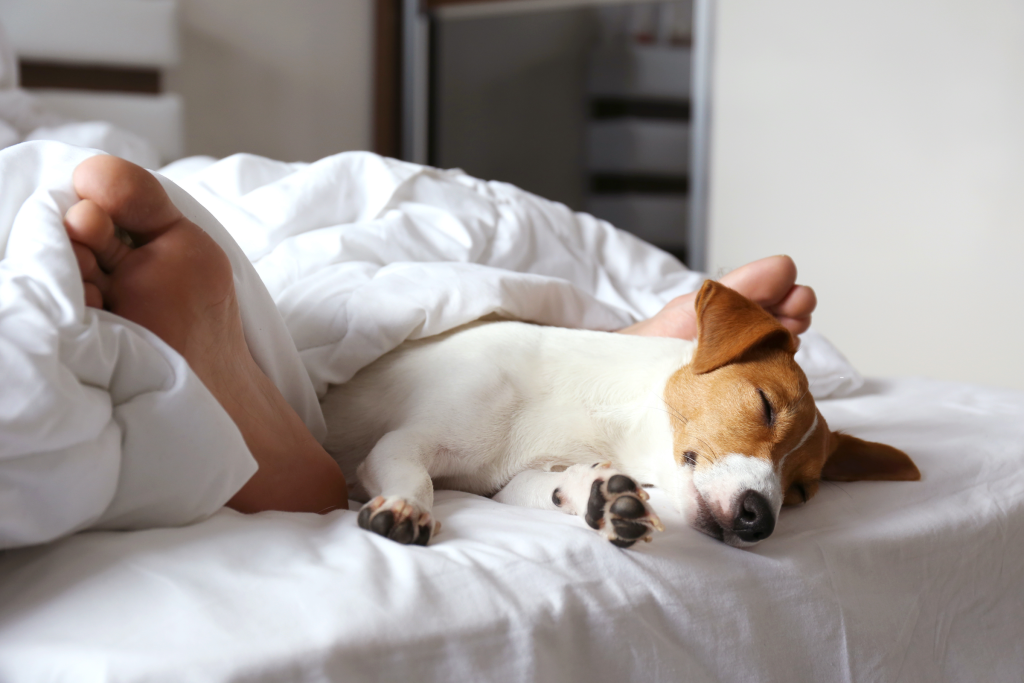Why Does My Puppy Breathe So Fast When Sleeping: Insights into Canine Sleep Patterns
As pet owners, we often find ourselves asking, “Why does my puppy breathe so fast when sleeping?” It’s a concern that can cause us to worry about the well-being of our furry companions. Observing our puppies breathing rapidly in their sleep can indeed be startling, but it’s important to grasp that this phenomenon is typically normal and usually not a cause for alarm.
There are several reasons why your puppy may exhibit fast breathing patterns while sleeping. Firstly, puppies have a higher metabolic rate compared to adult dogs, which means they naturally breathe faster. This increased breathing rate helps to supply their growing bodies with the oxygen they need for proper development and growth.
Another factor that contributes to rapid breathing in puppies is their active dreams. Just like humans, dogs experience REM (Rapid Eye Movement) sleep, during which they may twitch, move their legs, and even vocalize. These dream activities can cause an increase in their breathing rate, as their bodies respond to the excitement or stimulation happening in their dreams.
Additionally, puppies have smaller lungs and airways compared to adult dogs. This anatomical difference can result in faster breathing during sleep as their respiratory system works harder to maintain adequate oxygen levels. It is worth noting that as puppies grow and their lungs develop, their breathing rate may gradually slow down.

Why Does My Puppy Breathe So Fast When Sleeping
While fast breathing during sleep is generally normal for puppies, there are certain instances where it may indicate a potential health issue. If your puppy’s breathing seems excessively fast or irregular, accompanied by other concerning symptoms such as coughing, wheezing, or difficulty breathing while awake, it is crucial to consult a veterinarian for a thorough examination and proper diagnosis.
In conclusion, it is essential for puppy owners to understand that fast breathing during sleep is often a normal physiological response. Factors such as a higher metabolic rate, active dreams, and anatomical differences contribute to this phenomenon. However, it is always important to monitor your puppy’s overall health and seek professional advice if you notice any abnormal breathing patterns or accompanying symptoms. By being vigilant and well-informed, we can ensure the well-being and happiness of our beloved furry companions.
Understanding the Reasons Behind Your Puppy’s Fast Breathing During Sleep
When it comes to our adorable puppies, every little quirk and behavior can leave us curious and concerned. One common observation that often puzzles pet owners is why their puppies breathe so rapidly when they are asleep. In this article, we will delve into the various factors that contribute to this phenomenon and shed light on why it is usually nothing to worry about.
A Higher Metabolic Rate
One of the primary reasons why puppies breathe fast during sleep, leading to concerns like “Why does my Puppy breathe so Fast When Sleeping,” is their higher metabolic rate. Puppies are in a phase of rapid growth and development, which requires more energy. As a result, their bodies need to take in more oxygen to fuel their growing muscles and organs, addressing the question of “Why does my Puppy breathe so Fast When Sleeping.”
This increased oxygen demand leads to a naturally faster breathing rate, even when they are at rest, which explains the common query, “Why does my Puppy breathe so Fast When Sleeping.” The concern of “Why does my Puppy breathe so Fast When Sleeping” can be attributed to the fact that their metabolic needs are significantly higher during this growth-intensive period, necessitating a faster rate of respiration to accommodate their developmental needs
Active Dreams and REM Sleep
Just like humans, dogs experience different stages of sleep, including REM (Rapid Eye Movement) sleep. During REM sleep, puppies may exhibit various movements, such as twitching, leg paddling, or even vocalizations. These actions are often a reflection of their dreams. The excitement or stimulation in their dreams can cause an increase in their breathing rate as their bodies respond to the dream activities. It’s important to note that these dream-related breathing patterns are completely normal and should not be a cause for concern.
Anatomical Differences
Puppies have smaller lungs and airways compared to adult dogs. This anatomical difference can contribute to faster breathing during sleep. Their respiratory system works harder to maintain sufficient oxygen levels due to the limited capacity of their developing lungs. However, as puppies grow and their lungs mature, their breathing rate tends to normalize over time.

Why Does My Puppy Breathe So Fast When Sleeping
Potential Health Concerns
While fast breathing during sleep is typically harmless, there are instances where it may indicate an underlying health issue. If your puppy’s breathing appears excessively fast or irregular, accompanied by other concerning symptoms such as coughing, wheezing, or difficulty breathing while awake, it is crucial to seek veterinary attention. These symptoms could be indicative of respiratory infections, allergies, heart problems, or other medical conditions that require proper diagnosis and treatment.
Conclusions
In conclusion, if you’re wondering, “Why does my puppy breathe so fast when sleeping?” you’re not alone. Many pet owners observe this behavior and seek understanding and reassurance about their furry friend’s health. For an in-depth exploration of this topic, consider visiting geepets.com, where you’ll find a wealth of information on canine sleep patterns, health concerns, and how to ensure your puppy is getting the rest it needs.
Additionally, for further reading and resources on dog health and behavior, The American Kennel Club (AKC) offers expert advice and answers to common questions about your pet’s well-being. Both of these resources can provide valuable insights into your puppy’s fast breathing during sleep and help you ensure they are healthy and happy.
Practical Recommendations for Managing Your Puppy’s Fast Breathing During Sleep
1. Regular Veterinary Check-ups
Scheduling regular check-ups with a veterinarian is crucial to monitor your puppy’s overall health and well-being, especially if you’re wondering, “Why does my puppy breathe so fast when sleeping?” These visits are vital in identifying any underlying medical conditions that may contribute to the question, “Why does my puppy breathe so fast when sleeping?” Your vet can provide targeted guidance on managing your puppy’s respiratory health, specifically addressing the concern of “Why does my puppy breathe so fast when sleeping?”
Addressing the question “Why does my puppy breathe so fast when sleeping?” during these check-ups allows your veterinarian to offer personalized advice and interventions. This professional insight is invaluable for pet owners grappling with concerns like “Why does my puppy breathe so fast when sleeping?” as it ensures any health issues are promptly identified and managed.
2. Provide a Comfortable Sleeping Environment
Creating a cozy and comfortable sleeping space for your puppy is crucial, especially when you find yourself pondering, “Why does my puppy breathe so fast when sleeping?” Ensure that the bedding is clean, soft, and appropriate for their size to provide the utmost comfort. It’s essential to avoid placing their bed in drafty areas or near sources of excessive noise, as these factors can disrupt their sleep. Such disturbances might lead to you frequently asking, “Why does my puppy breathe so fast when sleeping?” This concern can be a reflection of the quality of their sleeping environment impacting their relaxation and breathing patterns.

Why Does My Puppy Breathe So Fast When Sleeping
3. Maintain a Calm and Stress-Free Environment
Puppies are sensitive to their surroundings, and stress or anxiety can affect their sleep quality. Create a calm and stress-free environment by providing them with a designated space where they can relax and unwind. Minimize loud noises, sudden disruptions, and excessive activity in their sleeping area to promote peaceful sleep.
4. Monitor Exercise and Activity Levels
Regular exercise is essential for a puppy’s overall health, but excessive physical activity close to bedtime can lead to increased excitement and cause faster breathing during sleep. Ensure that your puppy gets adequate exercise during the day, but try to schedule their last play session or walk a few hours before bedtime to allow them to wind down and relax before sleep.
5. Avoid Exposure to Irritants
Puppies can be sensitive to environmental irritants such as dust, pollen, and certain chemicals, leading many pet owners to wonder, “Why does my Puppy breathe so Fast When Sleeping?” These irritants can cause respiratory discomfort and potentially lead to faster breathing during sleep, further prompting the question, “Why does my Puppy breathe so Fast When Sleeping?” Keeping your puppy’s sleeping area clean and free from dust and allergens is crucial in addressing the concern, “Why does my Puppy breathe so Fast When Sleeping?”
Avoid using harsh cleaning products or strong fragrances that may trigger respiratory issues, as this can be a significant factor for anyone puzzled by, “Why does my Puppy breathe so Fast When Sleeping?” By creating a clean, allergen-free environment, you can help minimize the factors contributing to your observation of, “Why does my Puppy breathe so Fast When Sleeping?” and ensure a healthier, more comfortable rest for your puppy.
6. Seek Professional Advice when Needed
If you have concerns about your puppy’s breathing patterns during sleep or notice any other unusual symptoms, do not hesitate to consult a veterinarian. They can provide personalized advice based on your puppy’s specific needs and help address any potential health issues that may be contributing to the fast breathing.
7. Stay Informed and Educated
Continue to educate yourself about puppy care and respiratory health. Stay updated on common conditions that may affect your puppy’s breathing and learn about preventive measures you can take to ensure their well-being. By staying informed, you can provide the best possible care for your furry friend.
Remember, while fast breathing during sleep is often normal for puppies, it is crucial to monitor their overall health and seek professional guidance if you have any concerns. With proper care, attention, and a little bit of understanding, you can help your puppy enjoy restful and peaceful sleep.






















